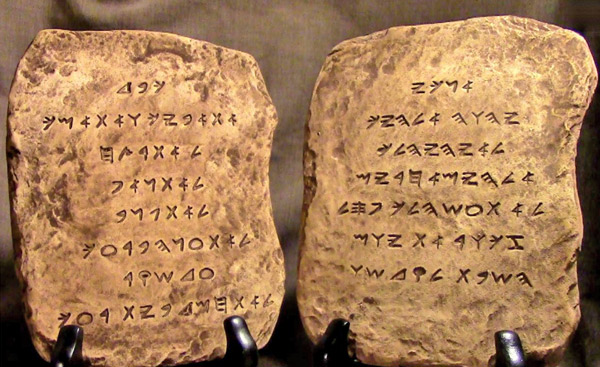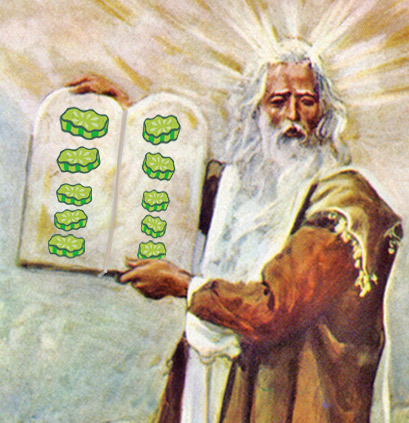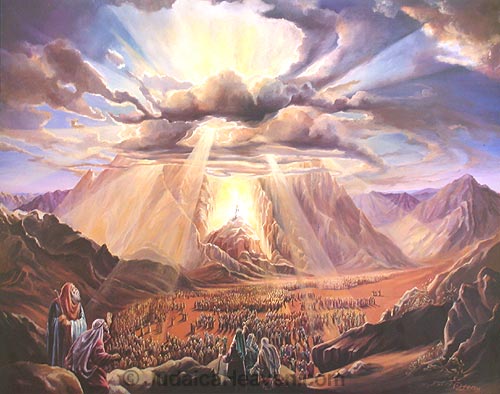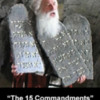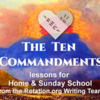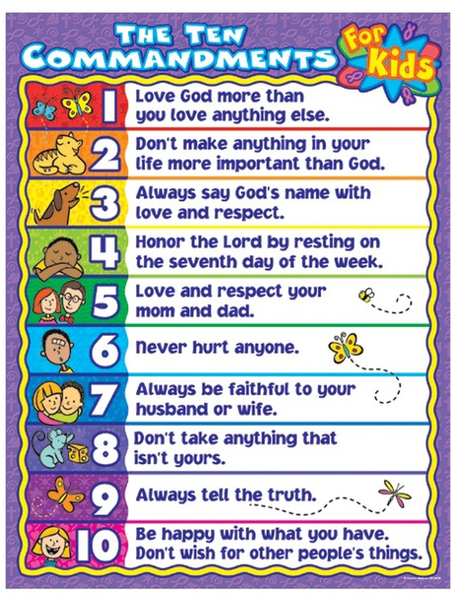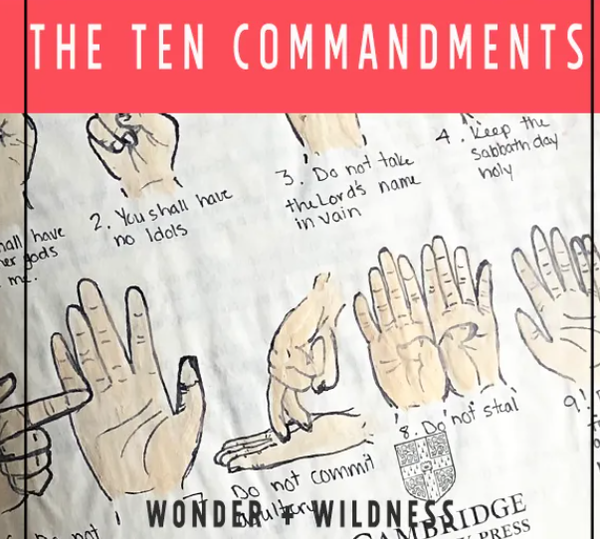A Ten Commandments Bible Background
and Bible Study
from Rotation.org's Writing Team
Normally our Bible Backgrounds are written for Sunday School leaders and teachers, however, this one is also geared for home-use by families who will be using one or more of the lessons in this set. The following background is written like a lesson of its own!
 See this set's Lesson Objectives listed in the next post below this one and on the Lesson Summaries post.
See this set's Lesson Objectives listed in the next post below this one and on the Lesson Summaries post.
The Ten Commandments are the "ten rules for living the right way" carved into stone by God and given to Moses on top of Mount Sinai during their Exodus journey from Egypt to the Promised Land. (More backstory below!) Considered by many to be the foundation of law in Western Civilization, you might also call them "Rules that Rock!" ...or simply "God's Rules." Your choice ![]()
So... how many of the Ten Commandments do you remember?
See how many you can say out loud.  If you're in a group, have each person take turns saying one until you've got them all.
If you're in a group, have each person take turns saying one until you've got them all.
Hint: The Ten Commandments are listed in these two books of the Bible: Exodus 20:1-20 and Deuteronomy 5:1-21. Take a look to see how many you remembered.
Question: Why are the Ten Commandments important to you? to our society?
Keep in mind: Forgetting a couple doesn't make you a bad person. It just means you need to spend a little more time learning them.
Pickles ? 
 According to a recent survey, only 45% of Americans could recall the commandment “honor thy father and mother,” but 62% knew that Big Macs have pickles. And should we be scared that 30% of church-goers FORGOT that “thou shalt not murder” and “thou shalt not steal” were part of the Ten Commandments?
According to a recent survey, only 45% of Americans could recall the commandment “honor thy father and mother,” but 62% knew that Big Macs have pickles. And should we be scared that 30% of church-goers FORGOT that “thou shalt not murder” and “thou shalt not steal” were part of the Ten Commandments? ![]()
Hopefully, you remembered those two ![]() (You did, didn't you?)
(You did, didn't you?)
Question: Can you follow something that you don't remember? Probably not! (Try forgetting the directions on your homework or trip to the store. Or if you need to get out of your chair right now, try walking around the room with your eyes closed.) And that's why each of the lessons in this set has a "memory" game -- to see and remember all ten pickles so we don't find ourselves in one. ![]()
What's the most important thing to remember about the Ten Commandments?
 LOVE
LOVE  The commandments teach us to love God and love others. This summary is brought to you by Jesus himself when he was asked "what is the greatest commandment" and instead of picking one, he summed them all up in TWO:
The commandments teach us to love God and love others. This summary is brought to you by Jesus himself when he was asked "what is the greatest commandment" and instead of picking one, he summed them all up in TWO:
“‘You shall love the Lord your God with all your heart, and with all your soul, and with all your mind.’ This is the greatest and first commandment. And a second is like it: ‘You shall love your neighbor as yourself.’ On these two commandments hang all the law and the prophets.” Matthew 22:36-40.
This passage is known as "The Great Commandment" though it really should be plural, as in "commandments." For more on what it means to "love" check out Paul's famous words in 1 Corinthians 13.
Which Version of the Ten Commandments Should You Learn?
Whichever version you feel most comfortable with. ![]() We're using the NRSV in most of the lessons in this set, but you can substitute your preferred version.
We're using the NRSV in most of the lessons in this set, but you can substitute your preferred version.
The "Backstory" on the Ten Commandments
Exodus chapter 19 is the really dramatic scene of God telling Moses what to say to the people, what their purpose is. "...you shall be for me a priestly kingdom and a holy nation. Tell them!" What a sight it must have been with God's thundering voice!
Check out this next short clip from Cecil B. DeMille's classic "The Ten Commandments" -- the scene where God writes the commandments on stone with his "finger." (Exodus 31:18)
The Ten Commandments were so important that the Israelites built a special gold-covered  box to carry the stone tablets to the Promised Land. The box was called the "Ark of the Covenant." During the Exodus journey, they rested the box and tablets inside a worship tent called "The Tabernacle." When they made it to Jerusalem, they built a Temple out of stone and placed the box with the tablets in the "Holy of Holies" -- the most important place in the sanctuary. Nobody knows for sure what happened to that box. It may have been carried off by some invading army and melted down. It was definitely not put in a government warehouse at the end of a movie
box to carry the stone tablets to the Promised Land. The box was called the "Ark of the Covenant." During the Exodus journey, they rested the box and tablets inside a worship tent called "The Tabernacle." When they made it to Jerusalem, they built a Temple out of stone and placed the box with the tablets in the "Holy of Holies" -- the most important place in the sanctuary. Nobody knows for sure what happened to that box. It may have been carried off by some invading army and melted down. It was definitely not put in a government warehouse at the end of a movie ![]() . And while the box and tablets were pretty cool, it's what was ON the tablets that made them important -- and those we carry with us.
. And while the box and tablets were pretty cool, it's what was ON the tablets that made them important -- and those we carry with us.
What's in the box won't melt your face -- it's only supposed to melt your heart
and be written there -- which means YOU are the real Ark of the Covenant 
keep my commandments and live,
keep my teachings as the apple of your eye;
bind them on your fingers,
write them on the tablet of your heart.
(Proverbs 7:2-3)
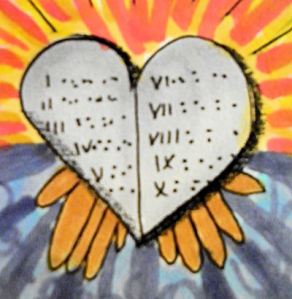
Questions: When people look at your life, how you treat others, and your relationship with God, do they say "there goes the Ark of the Covenant" or "there goes an empty box"?
What are some of the not-so-great rules people make the center of their lives? (how about selfishness? or greed?)
The Purpose of the Ten Commandments
God gave us the Ten Commandments to teach us right from wrong. If everybody followed them, what a wonderful world it would be.
But...as everyone who has ever TRIED to KEEP all ten has discovered, God also gives us the commandments to humble us. Paul put it this way: We all sin and "fall short" of God's expectations. (Romans 3:23) So in addition to guiding us how to live, the commandments show us our need for forgiveness -- which God graciously offers.
Does God's grace let off the hook from trying to keep the Ten Commandments? By no means! Instead of following out of fear, or thinking we can "earn more points," we follow God's rules in GRATITUDE for all that God has done, is doing, and will continue to do for us.
What's this I hear about "The Law?"
Sometimes people refer to "Ten Commandments" as "The Law of Moses" but they are not exactly the same thing. The "Law of Moses" usually refers to the 600+ "religious rules" found in the Old Testament which came after the Ten Commandments. Many of those laws were about how to worship, when and how to celebrate festivals, "clean and unclean" things and such. Most Christians and many Jews these days no longer follow those 600+ Old Testament laws because we recognize that they were more like "traditions" from another time and place. As the story of Jesus' disciples plucking grain on the Sabbath illustrates, some of those "laws" had become oppressive. Following on Jesus' teachings, the Apostle Paul declared we are "free" from those kinds of laws and that it is "loving others (that) fulfills the law." (Romans13:8)
The Ten Commandments are for all people in every time and place. And if you can't remember all Ten, then just remember how Jesus and Paul made them even easier to remember and practice:  LOVE
LOVE 
There are more ways to "murder" someone than by taking their life...
Each lesson in this set includes an activity to remember all ten of the commandments. The Interactive virtual hike up Mt Sinai also introduces the important biblical concept of “Law” (and Grace) in relation to the Ten Commandments. Some lessons dig into particular commandments. Now some people might think that it's silly to teach kids about "killing or adultery," but as you'll soon see in the lessons, there are more ways to kill, cheat, and steal than by taking their life or stuff.
On first, look, each commandment might seem simple, and you might skip over those like "don't murder" because (hopefully) you haven't killed anyone lately. But the beauty of these commandments is that their meaning can be explored in many ways -- and many of our lessons will do so. ![]() See the word studies at the end of this background for some interesting meanings.
See the word studies at the end of this background for some interesting meanings.
For example:
- You don't have to take a life to kill someone's dreams, murder their reputation or destroy their sense of self-worth. Can you think of other ways people "murder" each other? You can steal someone's self-esteem or spotlight or opportunity. Name something someone has "stolen" from you. How did it make you feel?
- You can "lie" by cheating in a game or by trying to be someone you're not. You can also lie by hiding your faith from your friends, or not standing up for the oppressed. How do lies destroy trust?
- You might think you have "honored" your parents by doing nice things for them, but "honoring" can also mean forgiving them, respecting their values, and showing respect to them in front of your friends. How can you honor someone you disagree with?
- You might think you're "in the clear" with "the graven images" commandment (idols), but an "idol" can be anything a person values more than doing what God commands. Money, for example, is something many people "worship."
- You might think "well I'm not an adulterer," but in a way you are when you lust after things like money more than you desire time with your spouse (or family). And you will learn in the word study, adultery is also used to describe not keeping your sacred commitments. Who and what are you committed to?
- You might think that coveting is about "things" but underneath it's really about spiritual and personal emptiness. In fact, many of the commandments are warnings about an appetite for "more" that is "Never Enough." (Check out that song link and then take a serious look at what things in your life you may be "coveting" but will never really satisfy you.)
And Now for Some "Weird Commandment Math"
Did you know there were originally "15" Commandments?
This one minute YouTube clip of comedian Mel Brooks as Moses reveals this secret ![]()
Okay, there really are just ten, but would it surprise you to know that there are two different ways to "number" the Ten Commandments? Of course it wouldn't.
1 + 2 = 1 and 10 - 9 = 10
 Orthodox Christians and most Protestants traditionally separate "you shall have no other gods" and "do not make idols" into two commandments. Whereas, Catholics and Lutherans traditionally combine those two verses into one commandment, and then split the verses about coveting into two commandments: don’t covet your neighbor's wife (9) and don’t covet anything else (10). See the attached chart for the breakdown. (BTW: The lessons in this set use the Jewish-Protestant-Reformed numbering. Feel free to adjust the numbering as you need.)
Orthodox Christians and most Protestants traditionally separate "you shall have no other gods" and "do not make idols" into two commandments. Whereas, Catholics and Lutherans traditionally combine those two verses into one commandment, and then split the verses about coveting into two commandments: don’t covet your neighbor's wife (9) and don’t covet anything else (10). See the attached chart for the breakdown. (BTW: The lessons in this set use the Jewish-Protestant-Reformed numbering. Feel free to adjust the numbering as you need.)
How Few Can You Do? 10 to 2 to 1
The Bible never refers to the "Ten Commandments" as the "Ten Commandments." Rather, the Bible and Jewish Talmudic tradition calls them "The Ten Words." And nowhere does it mention what those "ten words" are -- it's just assumed that everyone knows (and no, "pickles" is not one of those words). Leave it to JESUS to condense it down to five words: "Love God. Love your neighbors." It was, however, THE BEATLES who got God's commandments down to just one word: All you need is  . (All together now...) Who knew?
. (All together now...) Who knew? ![]()
A Couple of Ten Commandment Word Studies
 It's no secret that the meaning of words changes over time. Take the word "groovy" for example. Is it describing a Lays potato chip or a cool cat? The photo at the top of this document shows the commandments as they may have been originally written in "paleo-Hebrew" -- the language of Moses' day some 3400 years ago. And ever since then people have been using different words and languages to describe what the original commandments were saying.
It's no secret that the meaning of words changes over time. Take the word "groovy" for example. Is it describing a Lays potato chip or a cool cat? The photo at the top of this document shows the commandments as they may have been originally written in "paleo-Hebrew" -- the language of Moses' day some 3400 years ago. And ever since then people have been using different words and languages to describe what the original commandments were saying.
For example, most older folks will remember the third commandment as "thou shalt not take the Lord's name in vain" -- "vain" being a 17th Century word used in the King James Bible right on up through the Revised Standard Version in the first half of the 20th Century and was understood to mean "useless." But most modern translations, including the NRSV and NIV, use the phrase "do not make wrongful use" instead of "vain" because the meaning of the word "vain" had changed to "easily flattered" in common usage.
But even "wrongful use" isn't as descriptive as it could be. The Hebrew word for "take" ("nasa") in the commandment means to "lift up, exalt, carry." The Hebrew word for "vain" ("shav") is much more interesting than "wrongful use." "Shav" means "empty" or "useless." Thus, instead of the usual, "don't swear" using God's name, the commandment could more pointedly be saying something like Jesus said in Matthew 6 when he described people who liked to be seen praying and heaping up empty phrases. Jesus called them "hypocrites" (fakes). So the commandment could be read as "Thou shall not be a hypocrite." Lots of interesting possibilities!
 The word for "graven" image or "idol" comes from the Hebrew "pacal" meaning, "to carve, cut, or quarry" -- which is how you made statues of gods back then, by carving or stone cutting. if you've ever carved something, you know it takes time. And isn't it true that the things we spend our time doing tend to become our gods. You also dig quite a hole for yourself when you quarry false gods.
The word for "graven" image or "idol" comes from the Hebrew "pacal" meaning, "to carve, cut, or quarry" -- which is how you made statues of gods back then, by carving or stone cutting. if you've ever carved something, you know it takes time. And isn't it true that the things we spend our time doing tend to become our gods. You also dig quite a hole for yourself when you quarry false gods.
The Hebrew word for "murder" or "kill" in the Ten Commandments ("râtsach") has been the subject of much interpretation. It typically means to "murder" without justification (as opposed to "in self defense.") Interestingly, the word "ratsach" comes from an even older Hebrew word which can also mean "dash to pieces, throw, cast down, topple, bring low" which are certainly other ways to "murder" people without killing them. Check out these translations of Psalm 62:4 which render the word "ratsach" in some interesting ways.
The Hebrew word for "adultery" ("na-aph") can refer to infidelity by a husband and wife, but also by anyone breaking their solemn promise or covenant. For example, Israel was accused of adultery when it "lusted" after other gods (See Jeremiah 2:23-3:14 where even the children are accused of "na-aph"). Who do we have solemn obligations and promises to and how do we break them?
The Hebrew word for "covet" ("chamad") can be translated "lust, desire, or delight." It describes a "hunger" that cannot be satisfied, a feeling of emptiness or lack of self-worth that possessions cannot fill. It can destroy relationships, and drive us to break all the other commandments. What fills you up? What should godly people be "hungering" for? (Hint: Matthew 5:6.)
Note: Some interpreters and lesson publishers like to use the phrase "be content with what you have" which isn't what the commandment about "coveting" suggests. The idea that God gives what people deserve and that they should be "content with their lot" has a problematic social history behind it. According to Jesus in the Beatitudes, the opposite of hunger is not contentment, but a righteous hunger (pursuit) for the things of God.
Jesus' Fresh Take on the Ten Commandments
In John 13:34, Jesus said,
I give you a fresh* commandment,
that you love one another.
Just as I have loved you
you also should love one another.
* Most translations use the phrase "I give you a new commandment." But as we have seen, "love" is not a new commandment, it is at the root of each -- a point Jesus makes in Matthew 22's "Great Commandment" (Love God, Love your neighbor). Fortuitously, the Greek New Testament word for "new" ("kainos") can also mean "fresh." 
Written by Rev. Neil MacQueen for the Rotation.org Writing Team
Copyright Rotation.org Inc.

 Welcome to the Writing Team's Ten Commandments Lesson Set!
Welcome to the Writing Team's Ten Commandments Lesson Set!